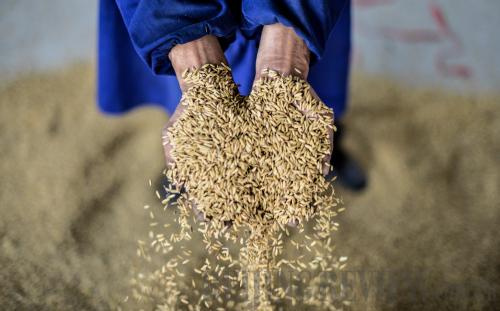|
 |
|
RICE OR POISON?: A farmer in Youxian County, central China's Hunan Province, presents his rice on May 23, where three mills were found to have sold rice contaminated with cadmium, a toxic metal (BAI YU) |
The food safety watchdog of Guangzhou, capital of south China's Guangdong Province, said it would expand inspections on May 19 after detecting cadmium in eight samples of rice products.
The move aims to ensure only quality rice, rice noodles and related products are sold in the southern metropolis where the grain is a staple food, according to a statement released by the Guangzhou Food and Drug Administration.
"All packages of tainted rice and rice noodles have been sealed shut," it said.
From January to March, the administration checked 18 samples of rice from local markets and found eight had cadmium levels exceeding national food safety standards.
Cadmium is a highly toxic heavy metal used in pigments and batteries. Excessive cadmium intake can lead to kidney failure, lung impairment, bone diseases and cancer. Monitoring cadmium levels is a priority for many countries' grain production.
Cadmium-tainted rice products were found in two university cafeterias and two restaurants in Guangzhou, with some samples reaching twice the national limit of 0.2 mg per kg. Their suppliers are based in Zhuzhou and Hengyang cities in central China's Hunan Province and Dongguan of Guangdong.
More tainted rice products were also found in Shunde District in Guangdong's Foshan, the local Nanfang Daily reported on May 21. Inspectors found nine batches of tainted rice during a district-wide inspection campaign.
Contaminated rice has long been a problem in China. A Nanjing Agricultural University research in 2011 found that around 10 percent of rice sold across the country contained excessive amounts of cadmium.
"Cadmium in rice usually comes from the soil where it grows, and the soil was polluted by mining and chemical waste," said Fan Zhihong, a food safety expert at Beijing-based China Agricultural University.
Soil pollution
Xu Xudong, Deputy Director of the Institute of Hydrobiology of the Chinese Academy of Sciences (CAS), said that rice with excessive cadmium indicates that soil pollution in China has affected grain quality and safety.
"We have been concerned that accelerated urbanization will increase demand for land," said Xu, warning that the nation's total arable land acreage could fall below the government's target for minimum availability of 120 million hectares. "But now, we should also worry about the damage from heavy metal pollution on cultivated land."
He said there could be immeasurable disaster if grain-producing areas are allowed to randomly introduce industries likely to bring heavy metal pollution in order to develop local economies, and called for immediate government measures to control soil contamination.
Pan Genxing, a soil scientist at Nanjing Agricultural University, said that the soil pollution in China is more severe than other countries, and the effect may last 30 years or worsen even further.
A Ministry of Environmental Protection (MEP) survey of 4.5 million square km of land indicates soil quality in more developed regions, such as the Pearl and Yangtze river deltas in south and east China and the Bohai Economic Rim surrounding Beijing and Tianjin, has deteriorated to different extents.
China is facing a grave situation in soil pollution of arable land, with problems including expanding use of pesticides and chemical fertilizers, heavy metal contamination and pollution at mining and factory sites, said Zhou Yikai, an environmental medicine researcher at Huazhong University of Science and Technology in Wuhan, Hubei Province.
| 